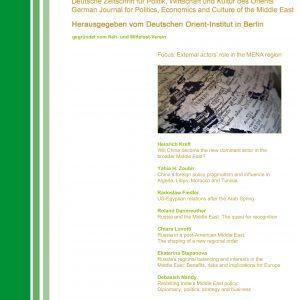Description
The Cold War’s bipolarism first and the US’ unipolar moment after, have shaped the international order for decades, including the MENA regional order. Over the last few years, globally and regionally, a redistribution of power seems to be taking place. As the US role as the unchallenged security provider in the region is steadily declining, new powers are rising and old ones are making their return. Russia belongs in the latter category, and provides the most successful example: after years of quasi-absence, not only Moscow is back but it has become one of the most determinant players in the region affairs. Much of this success builds on the historical advantage that the Russians enjoyed in the MENA region since early in the past century, which helps Russia to build on historical partnerships to establish collaborations. However, although elements of continuity with the past exist, Russia today behaves differently. This article challenges some of the most common assumptions when dealing with Russia’s role in the MENA. Particularly, the narrative of the region as the stage for US-Russia competition sounds obsolete, for Russia seems to be moving in a largely post-American scenario.
Chiara Lovotti is a Doctoral Fellow at the University of Bologna and a Visitor at the School of Global and Area Studies of the University of Oxford. She is a specialist in the international relations of the MENA region, with a focus on Russia’s foreign policy in the area and associated political and security issues. Her current academic research explores the Soviet Union’s impact on the state-building processes in postcolonial Arab countries, especially Egypt, Iraq and Syria. Chiara is also Fellow at the Europaeum Scholars Programme and Associate Research Fellow at the Italian Institute for International Political Studies. She has recently co-edited a Routledge book entitled “Russia in the Middle East and North Africa. Continuity and Change”.




Reviews
There are no reviews yet.